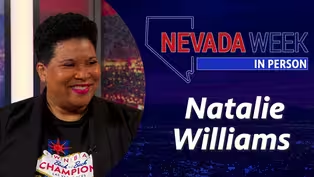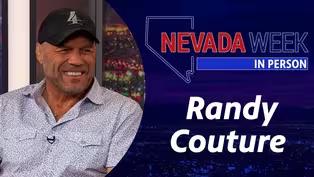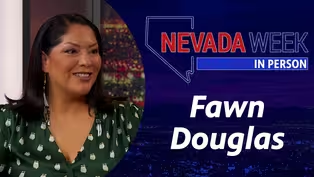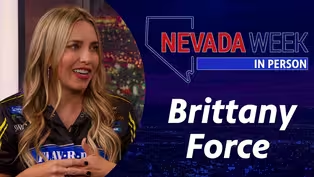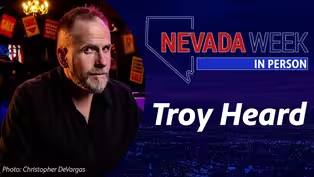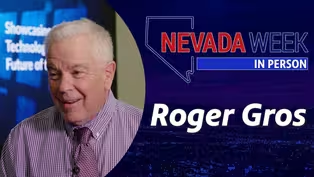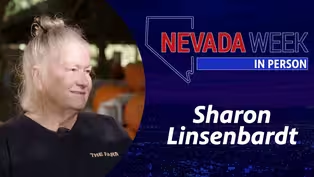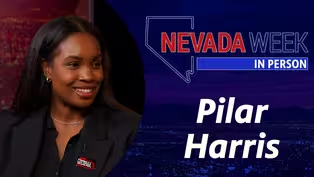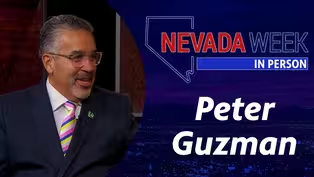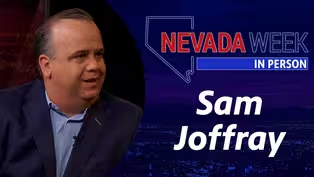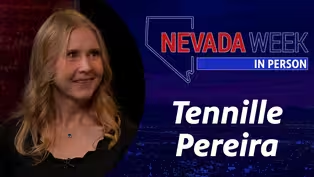
Nevada Week In Person | Jamie Little
Season 1 Episode 95 | 14mVideo has Closed Captions
One-on-one interview with Jamie Little, NASCAR Broadcaster
One-on-one interview with Jamie Little, NASCAR Broadcaster
Problems playing video? | Closed Captioning Feedback
Problems playing video? | Closed Captioning Feedback
Nevada Week In Person is a local public television program presented by Vegas PBS

Nevada Week In Person | Jamie Little
Season 1 Episode 95 | 14mVideo has Closed Captions
One-on-one interview with Jamie Little, NASCAR Broadcaster
Problems playing video? | Closed Captioning Feedback
How to Watch Nevada Week In Person
Nevada Week In Person is available to stream on pbs.org and the free PBS App, available on iPhone, Apple TV, Android TV, Android smartphones, Amazon Fire TV, Amazon Fire Tablet, Roku, Samsung Smart TV, and Vizio.
Providing Support for PBS.org
Learn Moreabout PBS online sponsorshipMore from This Collection
Nevada Week In Person goes beyond the roundtable discussion of Nevada Week with guests for a more casual conversation about their personal passions, new projects and compelling stories that are overlooked in the flurry of the news cycle.
Nevada Week In Person | Chet Buchanan
Video has Closed Captions
One-on-one interview with Chet Buchanan,Host & Creator, 98.5 KLUC’s The Chet Buchanan Show (14m)
Nevada Week In Person | Natalie Williams
Video has Closed Captions
One-on-one interview with Natalie Williams, General Manager, Las Vegas Aces (14m)
Nevada Week In Person | Randy Couture
Video has Closed Captions
One-on-one interview with Randy Couture, UFC Hall of Famer & U.S. Army Veteran (14m)
Nevada Week In Person | Fawn Douglas
Video has Closed Captions
One-on-one interview with Fawn Douglas, Artist and Activist, Nuwu Art (14m)
Nevada Week In Person | Brittany Force
Video has Closed Captions
One-on-one interview with Brittany Force, World Champion Drag Racer (14m)
Nevada Week In Person | Troy Heard
Video has Closed Captions
One-on-one interview with Troy Heard, Artistic Director, Majestic Repertory Theatre (14m)
Nevada Week In Person | Roger Gros
Video has Closed Captions
One-on-one interview with Roger Gros, Publisher, Global Gaming Business Magazine (14m)
Video has Closed Captions
One-on-one interview with Sharon Linsenbardt, Owner, Las Vegas Farm and Barn Buddies Rescu (14m)
Nevada Week In Person | Pilar Harris
Video has Closed Captions
One-on-one interview with Pilar Harris (14m)
Nevada Week In Person | Peter Guzman
Video has Closed Captions
One-on-one interview with Latin Chamber of Commerce Nevada President & CEO Peter Guzman (14m)
Nevada Week In Person | Sam Joffray
Video has Closed Captions
One-on-one interview with Sam Joffray, President & CEO, Las Vegas Super Bowl LVII Host Com (14m)
Nevada Week In Person | Tennille Pereira
Video has Closed Captions
One-on-one interview with Tennille Pereira, Director, Vegas Strong Resiliency Center (14m)
Providing Support for PBS.org
Learn Moreabout PBS online sponsorshipThe first woman Lead Announcer for NASCAR, Jamie Little, is our guest this week on Nevada Week In Person.
♪♪♪ Support for Nevada Week In Person is provided by Senator William H. Hernstadt.
-Welcome to Nevada Week In Person.
I'm Amber Renee Dixon.
During her 22-year career in sports broadcasting, she's covered nine Daytona 500s, eleven Indianapolis 500s, and eight Brickyard 400s.
The graduate of Green Valley High School in Henderson is also the first and only female to ever call a NASCAR race at the national level.
Jamie Little, thank you for joining Nevada Week In Person.
(Jamie Little) Yes.
Thank you so much.
To hear that, I feel like, gosh, I guess I've been around a while.
-I wonder what you think when you hear all those accomplishments.
-Well, I just feel like, to me, it stands out that I've really, I've stood by my passion.
It was my passion.
I fell in love with dirt bikes here as a little girl.
I think I was 12, 13-ish when I was first introduced to the world of Supercross.
You know at the time in Nevada, we didn't have other sports.
So racing it was in the desert.
So that fueled the passion.
I was always a tomboy at heart.
And you know, when I hear that, it's just like I stood by what I was truly passionate about, and I made it happen.
And I never veered from that.
-And how did you make the connection that going into TV would be the path to continue pursuing your passion?
-Yeah, that's really interesting, because I came to a point where I was graduating from Green Valley High School, and it was like, Okay, things are about to get real.
What are you going to do with your life?
Neither one of my parents had gone to college, so school wasn't really a thing.
I just wanted to get out in the world, and I realized, Okay, I'm gonna just take a leap of faith and move to Los Angeles and just see what happens out there.
And it's funny, because I always loved racing.
I would watch shows on the weekend; I'd watch the races.
And something stood out to me and talked to me, I guess you could say, and said, I can be that person interviewing these riders.
I can tell those stories.
I want to tell the fans about what's happening.
And by the way, there aren't any women that look-- nobody looks like me on TV.
It's in the magazines; you have the models and everything, which was fine.
But why not be me and represent fans like me?
So that's kind of what fueled that whole idea of, I could take my love and turn it into something in television.
-You did end up going to college, though, and working at the same time in Supercross?
-Yes, yes.
Well, I realized, Amber, that, you know, Okay, I'm onto something.
I love what I'm doing.
But what if it doesn't work out?
I need something to fall back on.
And I just-- I have a stepdad that's just tremendous.
He was a surgeon in town for many years.
And I just-- he didn't tell me I had to go to school, but I used him as an example of what school can do for you.
It was more just proving to myself that I could complete something, and it also allowed me while I was working to understand the things that I needed to do my job in television.
They worked hand in hand.
I got my associate's degree, and then I said, Okay, I'm going to continue, travel on the weekends, school during the week, and I finished from San Diego State University.
-Wow!
Is that a message you give to your children about education?
-Yes, that I think it is very important.
But I think it's more important in life to find something that excites you, something that gets you out of bed in the morning, and find a way to turn that into a job.
Don't find a way to get rich quick.
That's not what it's all about.
The money comes.
But find something you love, and you truly will find happiness in life.
-So you are now a full-time play-by-play announcer in the NASCAR national series, the Truck Series.
You started off in the ARCA Menards Series.
How would you describe that series?
-Yes.
It's interesting.
A few years ago, I got a call from a friend who's one of the best play-by-play announcers, Leigh Diffey.
And he's like, You know, Jamie, I was thinking.
These women are becoming play-by-play announcers for other sports, and nobody's doing it in racing.
You need to be the one to do it in NASCAR.
And I thought, Okay, I just-- I've never thought of it, because I always thought, I love my job in the pits.
It's-- you're in the action.
I mean, there's nothing better.
But I also always thought, That's a male voice.
That's a man that does that job, and why would I try to do that?
That would just be, you know, this uphill battle.
And lo and behold, I thought about it, and I said, He is right.
Now is the time.
I mean, at this point, I'm 42 years old.
Why in the heck am I going to get myself uncomfortable, right?
Things are comfortable right now.
I'm a mom.
I've got things figured out.
Life is good in the pits.
But I went for it.
And I think that's so important to get outside of your comfort zone and try something new, and I loved it.
So I started out in the development series, the ARCA Series.
It's national.
It's on FOX Sports.
But this is where the future stars of NASCAR on Sundays start.
So I'm learning who these guys are, telling their stories.
And it was such a great place for me to start, and I still do it.
But I moved up to the Truck Series this year, which is a NASCAR national series.
And that was a big deal in my mind because I thought, I'm sounding different, I looked different than these fans have ever seen before, and you're looked at through a magnifying glass.
Let's face it, when you're a woman in sports, as you know, you're looked through a thicker magnifying glass.
What does she know?
Does she say everything correct?
As soon as she says something that's not right, she's not credible.
So you're thinking of these things.
I'm like, But I've been doing it for 20 years.
I belong here.
It's just a different role.
So there was that adjustment period.
But I'll tell you, it's, I'm proud of myself that I stood with it because there were moments that, I mean, sleepless nights.
And I told my husband, Am I ruining my reputation by trying something so different where you're criticized so much?
But I'm glad that I stuck with it.
I love doing that job, but I also love my job in the pits on Sundays.
-That internal monologue you had, how did you get over it?
I mean that fear of failure, it's so poignant.
-It really is.
But I knew that in my gut, I've been doing this so long that I have that credibility.
It's hard when you're starting out and people don't know you from the next person, especially when you look and sound different.
And nobody has seen somebody in that role before.
And I think that I've just always been a little hard headed, a little stubborn.
If I want to do it, I'll do it, even though inside it could hurt at times.
I just don't let it show except for my husband.
He deals with me saying, Oh, my gosh, am I doing the right thing?
Am I doing a good job?
And I just stood, you know, by my belief that I could do it and didn't stop learning, didn't stop listening to critique how to get better, watch the people that I love and adore in that role.
And, and that's really helped a lot.
-There's an excerpt from an article about you I would like to read.
It's from Ron Kantowski in the Las Vegas Review-Journal.
He wrote, quote, Much like a baseball umpire, Little believes the highest praise women breaking down barriers in male dominated occupations can receive is not to be noticed.
Will you elaborate on that.
-I think that when you, like-- I'll go back to when I became a reporter in NASCAR.
I think that the highest praise you could get is when somebody says, She's my favorite reporter, not that's the best female reporter or she's my favorite female and I've got a favorite male.
It's just "best reporter."
You want to be one of the guys.
I'm not one of the guys.
I don't look like the guys, but you're one of them, and you're treated the same and looked at as just as credible.
And I deserve that because I've earned it.
I had to work my tail off for many years to get that credibility and to know that when I go talk to somebody--when I talk to a crew chief, an owner, a driver--people at home watching know, in fact, that I got that story straight from them.
And I think that's very important.
So I think that to me, if somebody could just be like, Oh, yeah, Jamie, I love her.
She's my favorite reporter.
She's, you know, my favorite play-by-play person.
To me, that's the highest praise.
And I think that what I'm saying in that quote is it's not being accentuated, the fact that I'm a woman.
I'm just there, and they like what I'm doing.
-So when I originally read that, I thought in these days of social media where it's a very much culture of "look at me," how are you going to advance or get promoted if you're not noticed?
-Yes.
Well, I let other people do the talking, I think, for me.
And that is a hot topic.
If you're the first to do something, no matter what you look like or where you come from, it's exciting.
With that comes responsibility.
And I've always said that, you know, if I am going to be a trailblazer, as people like to say, and the first to do something, I want to kick butt at it, because I know there's others watching.
And I want those other people to have that opportunity or know that they can go in there and tell their producer, Give me a shot, I won't let you down, because I did it, and it's possible.
If I can do it, trust me, if you saw my grades at Green Valley High School, you'd be like, Okay, she had to overcome a lot.
-I'm sure your teachers there are very proud of you.
But while we're talking about being noticed, of the moments in your career that have gone viral, which sticks out to you and why?
-It's interesting.
You do your job to tell the story.
You don't say, I'm going to be part of the story, but every once in a while with live sports, things happen.
And it was a race.
Gosh, it was the last year I was with ESPN, 2014.
We were racing at Texas during the playoffs.
It was a cup race, and Jeff Gordon was involved with Brad Keselowski.
And they got together, and Brad cut Jeff's tire.
And I knew things were gonna get heated, so I got down to their pits before the end of the race.
And we got down there, and I'm waiting for the interview.
And lo and behold, pushing, shoving.
Suddenly there's 200 grown men punching and yelling around me, and I'm right in the middle.
And there's pictures of me with my elbows up.
I'm like, I'm not moving.
Don't try to move me out because I'm a woman.
I have the right to stand here and get the first word from Brad.
And I'll get the first word from Jeff.
And it was just one of those moments.
It's funny.
Like, I love-- I love emotion.
I love being in the middle of those moments, and I found my way into many fights on TV.
I don't know, I just want that emotion.
I want to hear from them.
Why?
What makes you agitated?
What makes you so, like, hurt about this?
What makes you so fired up?
I love that.
And so that moment went viral.
I mean, well, there's, there's a couple moments, but that was one that really stood out.
I still-- people still ask me about it, because I have a ponytail.
So you see my ponytail in the shot, like, Back off!
-Well, speaking of that ponytail, what about when you whipped John Cena?
-That was another one.
-And that was a mistake.
-It was a total mistake.
So it's the Daytona 500, the biggest race of the year, right?
It's the pre-race show.
It's my second year with FOX.
John Cena has this new show on FOX, and it's important for them to talk to him.
I think he was driving the pace car or something.
So he was on the grid.
I meet him, Hey, I'm Jamie Little.
I'm going to interview you, so just hang tight.
I'm gonna walk to you.
Well, it was packed.
The grid was packed.
If you've been to a NASCAR race, you know the access is unbelievable.
So I'm there.
It's time to do the interview, and my cameraman comes to me.
And we're walking.
I'm walking backwards to get to John Cena.
But it's so packed, and I'm talking about the race cars.
We're on the grid, and all this stuff is happening.
And then I turn and I'm still talking, and then I'm like, Okay, and I do the toss.
I'm like, What the heck?
Where's John Cena?
They're like, You walked past him.
When you turned your head, your ponytail whipped him in the face.
I'm like, No!
It just, I was like, at first, I was seeing all social media on my phone.
I'm like, I've got to focus on the race.
I've got a race right now.
And then my husband's so quick.
He's like, John Cena does the "you can't see me" thing.
Just play it off like that.
Like my bosses, they're gonna fire me.
I know it.
I went with it, and, I mean, the Today show the next day, they were talking about it, showing the whip over and over.
I'm like, Okay, I guess I can laugh with it.
But you just don't know in those moments.
You just hope that you handle it with class and grace.
-Who would have known your ponytail would take center stage?
Before we end this interview, we only have a couple of minutes, we've talked about your passion for motorsports.
What about your passion for rescuing dogs?
Where does that stem from?
-Yes.
Well, I was born in Lake Tahoe, so not far from here, and just a tomboy.
But I was an only child, and I was drawn to animals at an early age.
That's all I can remember is having a bond with animals-- dogs, cats.
I had a horse that I got because I worked at a stable, and I was the first to ever ride this horse.
Moved him down here to Las Vegas with me, and I just-- there was something about animals that just speaks to me.
And when I signed with FOX in 2015, I had time available that I wasn't traveling all the time.
So I called up the Animal Foundation and said, How do I volunteer?
How do I help?
So I was a volunteer there for a couple of years.
I did a rescue calendar with Carrot Top, and Wayne Newton went to his house and brought puppies and had him holding puppies with his monkey.
And it was-- it was wild.
But I do that.
I continue my work all over the country.
When we go to towns with NASCAR, I'll find a shelter.
And I'll go there and make a donation, and I'll post pictures of their dogs for people to know.
But I have four rescues myself.
One came from the Animal Foundation, and I just-- I love animals, and there's such a need for people to adopt, people to foster.
We're in crisis mode, and Vegas is one of those very hard hit cities.
-Well, thank you for your work on that front and for joining Nevada Week In Person.
We really enjoyed having you.
And for more interviews like this, go to vegaspbs.org/nevadaweek.
♪♪♪

- News and Public Affairs

Top journalists deliver compelling original analysis of the hour's headlines.

- News and Public Affairs

FRONTLINE is investigative journalism that questions, explains and changes our world.












Support for PBS provided by:
Nevada Week In Person is a local public television program presented by Vegas PBS

